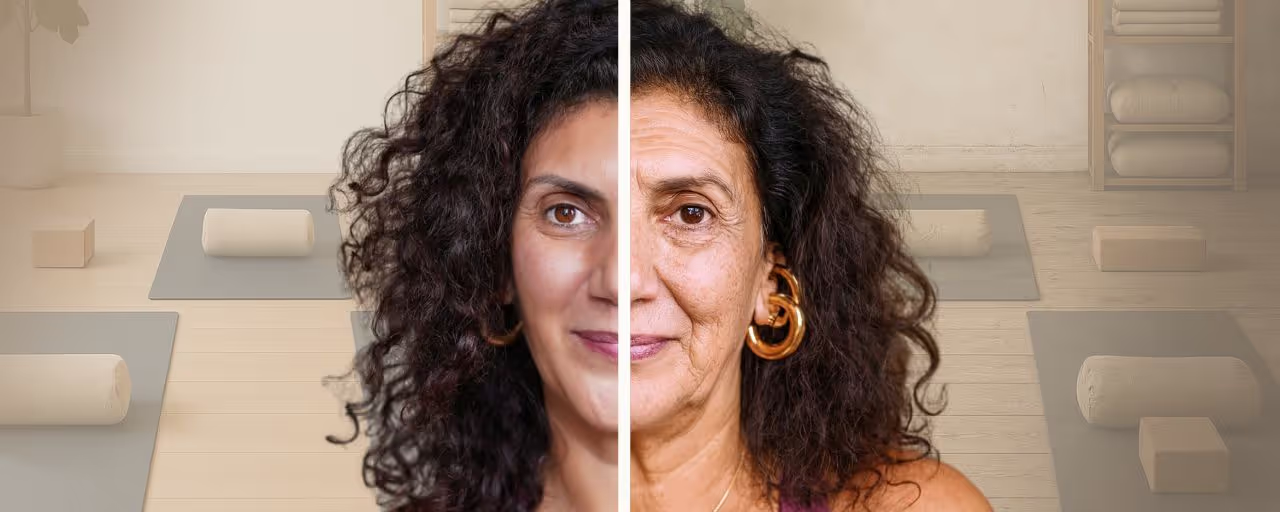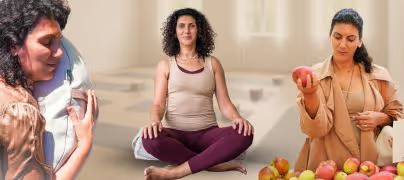"I'm only 28 – isn't this just for older women?" Maria asked last week. Later that day, Pamela, 67, wondered if she was "too late" to start Hormone Yoga Therapy after years post menopause.
These questions come up constantly in my practice. There's a common misconception that Hormone Yoga Therapy is only for women experiencing menopause. The truth is far more expansive and hopeful.
Your hormones don't suddenly matter only at 50. They've been guiding every aspect of your health since puberty, and they continue to influence your well-being long after your periods stop. Hormone Yoga Therapy can support you at any age – you just need to understand how to adapt the practice for your life stage.
The Myth That Needs Breaking
Somewhere along the way, we started thinking of hormone health as an "older woman's problem." This thinking does a disservice to women of all ages who could benefit from understanding and supporting their endocrine system.
Your hormones orchestrate everything from your energy levels and mood to your metabolism and sleep quality. Whether you're 25 or 75, these chemical messengers are working 24/7 to keep your body functioning optimally.
Hormone Yoga Therapy isn't about fixing something that's broken – it's about supporting something that's always working. The beauty of this practice is its adaptability to your body's needs at any stage.
For Women in Their 20s and 30s: Building Your Foundation
If you're dealing with PMS, irregular cycles, or fertility challenges, you're not too young for Hormone Yoga Therapy. You're actually at the perfect age to establish practices that will serve you for decades.
PCOS and Cycle Irregularities
Research shows remarkable results for younger women with hormonal imbalances. A 2021 study published in the Journal of Osteopathic Medicine found that three months of mindful yoga lowered testosterone levels by 29% in women with PCOS. Many participants saw more regular cycles and fewer acne breakouts – improvements that happened without weight loss.
This aligns with Dinah Rodrigues' observations that approximately 85% of women with PCOS who practiced HYT regularly for 4-6 months were able to conceive. That's not just a statistic – that's hope for women who've been told their options are limited.
Case studies document cycle regularization through integrated yoga approaches. The breathing techniques that stimulate your ovaries and the poses that increase pelvic circulation can help restore natural rhythms that birth control or stress may have disrupted.
The Fertility Connection
If you're trying to conceive, Hormone Yoga Therapy can be a powerful ally. The practice reduces stress hormones that interfere with ovulation while increasing blood flow to your reproductive organs. Many of my younger students find that their cycles become more predictable and their PMS symptoms dramatically decrease.
The key insight: it's never too early to support your hormonal health. The habits you build now create the foundation for how you'll experience perimenopause and menopause decades later.
For Women in Their 30s and 40s: Navigating the Early Changes
Perimenopause can begin quietly in your late 30s, even while your periods seem normal. This is actually the ideal time to start Hormone Yoga Therapy – before symptoms become overwhelming.
Early Warning Signs
You might notice subtle changes: periods that come a day or two earlier or later than usual, slightly heavier or lighter bleeding, mood changes that don't quite match your usual patterns, or energy dips that seem unrelated to your schedule.
These aren't signs that something is wrong. They're your body's way of communicating that your hormone production is starting to shift. Women who begin Hormone Yoga Therapy during this phase often report significantly easier transitions into full menopause.
Prevention vs. Crisis Management
Starting the practice now is like strengthening your core before you need to lift something heavy. You're training your endocrine system to maintain better balance as natural hormone production begins to fluctuate.
The dynamic breathing exercises help maintain healthy blood flow to your ovaries. The stress-reduction aspects prevent cortisol from interfering with your natural hormone cycles. You're essentially teaching your body to age gracefully from the inside out.
For Women in Their 40s and 50s: The Biggest Benefits
This is where most women discover Hormone Yoga Therapy, often out of necessity. Hot flashes, insomnia, mood swings, and other menopause symptoms drive them to seek natural solutions.
The research here is most robust. Scientific reviews consistently find that yoga can improve menopause-related quality of life, mood, sleep, and fatigue. One randomized controlled trial found that a 12-week yoga program significantly reduced overall Menopause Rating Scale symptom scores compared to no intervention.
What Makes This Age Different
During active menopause, your body is working hard to recalibrate its entire hormonal system. The intensive breathing techniques in Hormone Yoga Therapy can help stimulate hormone production during this critical transition period.
Many women in this age group are also juggling career demands, aging parents, and teenagers at home. The stress management aspects of the practice become crucial – not just for symptom relief, but for overall resilience during a demanding life phase.
Consistency Over Intensity
The beauty of starting Hormone Yoga Therapy in your 40s or 50s is that you don't need to be incredibly fit or flexible. The practice emphasizes consistency over athletic ability. Even 20 minutes, three times per week can create meaningful changes in how you feel.
For Women 60 and Beyond: It's Never Too Late
"Am I too old to start?" Margaret asked. At 67, she worried that her body was past the point where Hormone Yoga Therapy could help. She couldn't have been more wrong.
Post-Menopause Benefits
Even after your periods have stopped, your endocrine system continues functioning. Your adrenal glands, thyroid, and other hormone-producing organs still need support. The gentle movements help maintain flexibility and bone density. The breathing techniques support cardiovascular health and stress management.
Research specifically shows that yoga significantly improved insomnia and sleep quality in postmenopausal women, reducing depression, anxiety, and stress. These benefits matter enormously for long-term health and quality of life.
The Inspiration of Longevity
Dinah Rodrigues herself, at nearly 98, reportedly maintains excellent hormone levels and energy through her continued practice. While one person's experience isn't scientific proof, it demonstrates what's possible when we work with our bodies consistently over time.
As one researcher noted, "Yoga has so many benefits... it is accessible to such a wide array of ages and fitness levels." This accessibility means that women in their 60s, 70s, and beyond can safely practice modified versions of the techniques.
Adapting for Your Body
The practice naturally adapts to your current abilities. If you can't do dynamic movements, the breathing exercises alone provide significant benefits. If standing poses are challenging, many can be done seated. The energy work requires no physical strength at all.
The Universal Principles
Regardless of your age, certain principles remain constant:
Start where you are. Your body's current state is the perfect starting point. Don't wait until you're more flexible, less stressed, or "ready" in some imaginary way.
Focus on consistency. Twenty minutes three times per week beats one long practice once per week. Your endocrine system responds to regular, gentle stimulation better than sporadic intense efforts.
Listen to your body. The practice should feel energizing, not depleting. If something doesn't feel right, modify or skip it. Your body's wisdom is always the ultimate guide.
Be patient with results. Younger women might see changes in 4-6 weeks. Women in menopause typically need 8-12 weeks. Older women might need 3-4 months. Trust the process.
Your Hormones Deserve Attention at Every Age
Here's what I've learned from working with women across decades of life: there's no perfect age to start caring for your hormonal health, but there's also no wrong age.
In your 20s and 30s, you're building resilience for future transitions. In your 40s and 50s, you're supporting your body through major changes. Beyond 60, you're maintaining vitality and wellness for years to come.
Your hormones have been with you since puberty, and they'll influence your health until your final days. They deserve attention, support, and gentle care regardless of your age or life stage.
Whether you're 25 with PCOS or 65 and post-menopausal, Hormone Yoga Therapy meets you exactly where you are. Your body's capacity for balance and healing doesn't have an expiration date.
Ready to discover how Hormone Yoga Therapy can support your unique life stage? Click here to join the waitlist for my next HYT Group Program.
Free Email Course to Better Understand Your Hormones
Get clear, practical information directly to your email, to help you manage hormonal changes.
In just few minutes a day, you'll learn:
The real reasons behind hot flashes and mood swings
2-minute breathing techniques you can use anywhere
Simple yoga poses that balance your hormones
Quick fixes for sudden symptoms during meetings
Daily practices that create lasting change
Each email brings you closer to understanding and working with your body's natural rhythms.






